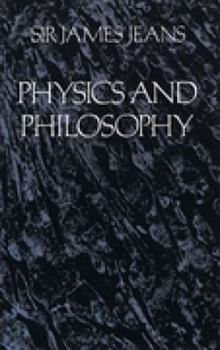Physics and Philosophy
Select Format
Select Condition 
Book Overview
"There is no more eloquent, interesting or persuasive exposition of what may be called science of philosophy than Sir James Jeans's." - The New York TimesCan we have any knowledge of the world outside... This description may be from another edition of this product.
Format:Paperback
Language:English
ISBN:0486241173
ISBN13:9780486241173
Release Date:February 1981
Publisher:Dover Publications
Length:244 Pages
Weight:0.58 lbs.
Dimensions:0.5" x 5.4" x 8.5"
Customer Reviews
4 ratings
The very best book I've ever read on philosophy
Published by Thriftbooks.com User , 15 years ago
Xenophanes thought that the sun was a fire which got restarted every morning. Socrates believed that there were certain people who by dint of skill deserved the legitimate right to rule over others. Aristotle believed that the universe revolved around the sun (even though he was aware of then contemporary theories suggesting the reverse). St. Augustine believed that there was tribe of people with no heads but with faces and mouths on their chests. Over the course of the centuries philosophy has been plagued by no shortage of errors. And in some cases, owing to the way in which they set back legitimate scientific discovery and exploration, the errors were not so innocent. In this one volume, Sir Jeans concisely exposits on the similarities and differences between science and philosophy. While both fields endeavor to explain reality, science does so according to a method which is definitionally testable and proveable. Eager to make big explanations philosophy all too casually casts testing and parsimony aside in favor of sweeping (and invariably wrong) generalizations. As this book makes clear, some philosophy is inevitable. Our only connection to the outside world is through our senses. Solopsism is the view that these sensory inputs are nothing but the product of our imaginings. In fact a line of philosophy...by Rene Descartes...built on just this premise. "Cogito ero sum." I think therefore I am. According to Descartes this proved the existence of God because God would not force us to exist alone. But as Francis Crick so concisely put it in his scientific book The Astonishing Hypothesis, a view that we're alone and that our senses reflect at least a version of what's out there is more consistent with a worldview where physical processes create things (including the ability on our part to contemplate those same things). But proceeding with circumspection and care we can endeavor to understand the world around us. As Jeans so poetically observes, we are like children picking up pebbles of wisdom...standing but at the shore of what is to be known...a concession hardly made by philosophy but which is the foundational cornerstone of good science.
Wonderful
Published by Thriftbooks.com User , 17 years ago
As a student studying physics and philosophy this is one of the best books I've read. Jeans gives a great survey of modern physic and modern philosophy (I've used this book as a reference several times this semester to clear up some issues since I am taking both modern physics and modern philosophy!) and draws great conclusions from both of them. The book is a wonderful read, a lot of good information but still very enjoyable. Overall one of my favorite books.
Consise, yet infinitely thought provoking
Published by Thriftbooks.com User , 18 years ago
Summed up, in my younger high school years this book guided me through my ponderings of the world and helped point me in a direction which has essentially shaped who I am today, a rational, yet questioning individual which is also what Mr. Jeans I think tries to accomplish with this writing. decades ahead of it's time, Sir. James Jeans talks of the foundational limitations of newtonian (clock-work like) physics as well as quantum level physics as if it was being studied like it is today. James Jeans' book is a remarkable triumph of non-fiction literature by being able to describe the uses and limitations of deep-lying mathematical concepts in almost strictly non-mathematical language. A truly elegant work!
An absolutely brilliant book
Published by Thriftbooks.com User , 19 years ago
This book is as timely now as when it was first published in 1944. It presents a brilliant summary of what modern physics does and does not say about the nature of the universe in which we exist, in the context of the historical development of physics and the corresponding developments in philosophy. Even better, it is written using language that is accessible to anyone, whether or not they have a background in science. It does not contain any mathematics, and no mathematical background is required in order to understand it. I wish I had read this book 20 years ago; it would have given focus to my ponderings about the nature of reality, time and mind.





